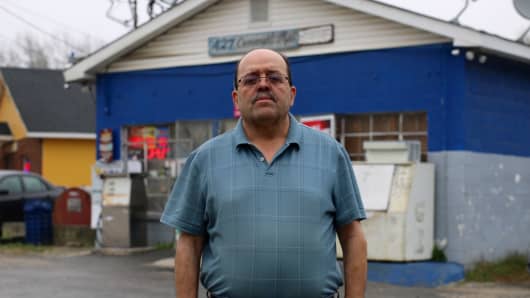Small businesses still fighting for cash seized by IRS
A tale involving a Maryland dairy farmer and North Carolina convenience store owner
CNBC.com
The business operations of a drug dealer or a terrorist have little in common with a Maryland dairy farmer.
But in a bizarre business tale, the IRS in February 2012 seized nearly $63,000 from a pair of dairy farmers after a series of cash deposits came under scrutiny due to federal laws. Those rules were intended to target criminals including money launderers, who deposit large amounts of cash in increments of less than $10,000 to evade authorities.

Source: Kate Rogers
Randy Sowers, a dairy farmer in Maryland, is trying to get back the full $63,000 that he says was wrongly seized by the IRS four years ago.
In a prior settlement with the government, Randy and Karen Sowers, who own South Mountain Creamery in Middletown, Maryland, got back a portion of the seized money, around $33,500. Now in a new letter filed this week to the Justice Department, a nonprofit organization that has has been working with the farmers is helping in the fight to get back the rest of the couple's money — $29,500 — despite the prior settlement.
"We know the right thing to do would be to give this money back," says Robert Everett Johnson, an attorney at the Institute for Justice public interest law firm.
Randy Sowers said his bank teller initially suggested that his wife keep deposits under $10,000 to avoid time-consuming paperwork at the bank. "We thought it was very legitimate," he said. Karen Sowers initially wanted to deposit $12,000 earned from a weekend farmer's market. "If I wanted to hide it, I would have put it in a can. We have trouble paying our bills and don't need the government coming and taking money from us."
Despite settling previously with the government, the Sowerses and Johnson say they are owed all of the assets, and initially had to settle for fear of losing the full amount seized and potentially more assets.
The IRS and Justice Department work closely together on these seizure-related cases.
"Federal law prohibits the IRS from discussing specific taxpayers," IRS spokesman Dean Patterson told CNBC by email. A Justice Department spokesman also declined comment on specific cases.
The Sowers case has attracted attention among small business owners, who argue time consuming paperwork and regulations sometimes can be nonsensical.
There have since been some policy changes. The IRS in October 2014 said it would restrict asset forfeitures to cases in which the property owner is suspected of criminal activity. And a policy directive from the Department of Justice issued last March says the asset forfeiture program will focus on the "most serious illegal banking transactions."
While the policy shifts are meant to apply toward future cases and doesn't necessarily apply to those impacted in the past, the development hasn't stopped the Institute for Justice or business owners from fighting for their cash.
Congress has even gotten into the fray. The House Ways and Means Subcommittee on Oversight took up the Sowers case, and asked the Treasury Department to review similar cases.
The related cases include Khalid "Ken" Quran, who owns a convenience store in Greenville, North Carolina. He had more than $150,000 seized in June 2014 after he unknowingly agreed to forfeit his bank account when IRS agents visited his store, accusing him of skirting reporting laws. Quran denies the charges.
The IRS said, 'You need to sign a paper'

Source: Ryan Dumville
Ken Quran, a convenience store owner in North Carolina, has had more than $100,000 seized by the IRS.
"He said, 'You need to sign a paper,' and I told him my English is not right," said Quran, an immigrant from the Middle East. "Then he read it to me like you would read the newspaper and said you need to sign it." Quran said he did nothing wrong. "No bank told me that. No bookkeeper told me that," he said.
He has not received any of his money back, and the Institute for Justice has also filed a petition on Quran's behalf. On Tuesday, the legal nonprofit send a letter to the IRS, asking for his petition to be reviewed.
The law to target large cash deposits "was passed to target drug dealers, money launderers and hardened criminals, but unfortunately it's being applied to people who are guilty of doing nothing more than business in cash," said Johnson.

Kate RogersCNBC Reporter

No comments:
Post a Comment